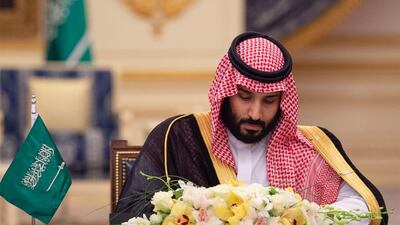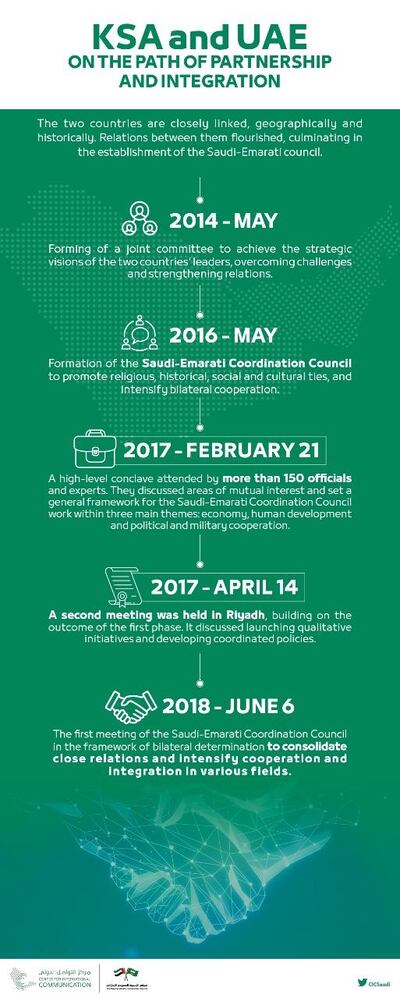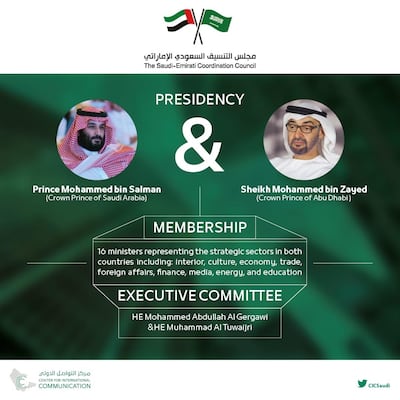The UAE and Saudi Arabia took the first step to accelerate joint co-operation with the first meeting of the Saudi-Emirati Coordination Council in Jeddah.
The meeting, chaired by Sheikh Mohammed bin Zayed, Crown Prince of Abu Dhabi and Deputy Supreme Commander of the UAE Armed Forces, and Mohammed bin Salman, Crown Prince of Saudi Arabia, outlined the council's organisational structure.
The two leaders have set a five-year time-frame to implement 44 joint projects in an initiative called the Strategy of Resolve.
Here's everything you need to know about the new council and new strengthened ties between Abu Dhabi and Riyadh.
Why did the Saudi-Emirati Co-ordination Council form?
The UAE and Saudi Arabia have shared deep-rooted brotherly ties. The two countries have a strong record of working together to further development and combat important regional and global issues.
In December, President Sheikh Khalifa issued a decree to consolidate ties between the UAE and Saudi Arabia and enhance cooperation on regional and global issues.
The Presidential decree aimed to key areas including defence, political institutions and the economy.
Who is on the Council?
The new council includes 16 ministers from high priority sectors in both countries.
The UAE members: Mohammad bin Abdullah Al Gergawi, Minister of Cabinet Affairs and The Future; Sultan bin Saeed Al Mansouri, Minister of Economy; Dr Anwar Gargash, Minister of State for Foreign Affairs; Obaid bin Humaid Al Tayer, Minister of State for Financial Affairs; Hussain bin Ibrahim Al Hammadi, Minister of Education; Dr Sultan Al Jaber, Minister of State; and Ali bin Hammad Al Shamsi, Deputy Secretary-General of the Supreme National Security Council.
The Saudi members: Prince Abdulaziz bin Saud, Minister of Interior; Prince Badr bin Abdullah; Mohammed Al Tuwaijri, Minister of Economy and Planning; Dr Majid bin Abdullah Al Qasabi, Minister of Commerce and Investment; Adel Al Jubair, Minister of Foreign Affairs; Khalid bin Abdulaziz Al Falih, Minister of Energy, Industry and Mineral Resources; Ahmed bin Aqeel Al Khatib, Board Chairman of the General Entertainment Authority; Mohammed Al Jadaan, Minister of Finance; and Yasir bin Othman Al Rumayyan, Chief Executive and Secretary-General of the Board at Public Investment Fund.
What is the Strategy of Resolve?
The strategy aims to create an exceptional model of integration and cooperation between the two countries through the implementation of joint projects that will enhance the contentment and prosperity of the people of the two countries.
Saudi and Emirati government officials from various fields worked for 12 months to identify and outline three main pillars for closer cooperation. They are:
- Economic
- Human and knowledge
- Political, security and military
The Council set a timeframe of five years to implement the projects outlined in the strategy.
What are the projects?
The economic pillar:
- Launching the policy of empowering the banking sector to enable branches of banks in the two countries to enhance their business and benefit from the available growth opportunities, and facilitate work procedures in both countries.
- Exchange of experiences in the field of modern financial technology to identify opportunities and challenges.
- Sharing experiences in the insurance sector to improve and support insurance markets in terms of products, pricing and regulatory mechanisms.
- Sharing experiences in infrastructure management.
- Sharing experiences in the field of safety and road maintenance.
- Establishment of a joint investment fund to invest in small- and medium-sized enterprises of the emerging industrial sectors in partnership with the private sector.
- Activate value-added manufacturing industries in combination with existing industries to support manufacturing industries and implement them through small and medium enterprises in building a precise and standardised industrial database as well as standardisation of coding systems for industrial goods and services.
- Conduct a joint exercise between the two parties to test the supply security system in key sectors.
- Develop a strategic medical stock plan, establish a joint plant for the manufacture of sensitive medical drugs, and establish a joint reference laboratory to achieve safety standards in this field and exchange experiences, cadres and medical staff in the field of emergency and crisis.
- Joint cooperation in the field of taxation.
- Facilitate the exercise of economic activities and exchange of investment opportunities through the establishment of a dedicated office to facilitate economic activities, and the establishment of a unified electronic portal linking the two countries to follow-up on complaints and suggestions concerning the common customs and markets.
- Facilitate the flow of traffic in the ports by addressing the obstacles facing the flow of traffic and trade across borders and proposing solutions.
- Establishing a joint venture company for agricultural investment, with a capital of Dh5 billion, to contribute to the provision of imported commodities to both countries and achieve sustainable food security.
- Adopting a unified strategy for food security in both countries to harness productive resources (agriculture, livestock and fisheries) and work on joint strategic projects to enhance future food security of the two countries.
- Establishment of a research center to develop and localise desalination technologies, to study the application of desalination techniques and the conversion of moisture into water using renewable energy and to consider the utilisation of thermal energy for evaporation and desalination processes.
- Establishment of a Council for Environmental Excellence to protect the environment and wildlife between the two countries, for the purpose of unifying environmental efforts and international positions and standardising the linking and monitoring processes in various environmental fields.
- Establishment of the Saudi-Emirati Investment Fund for Renewable Energy to attract large and startup companies and support them in funding research and development projects.
- Implementation of the Gulf electrical interconnection system, in order to benefit from the energy production capacity of both countries.
- Exchange of experiences and expertise in the nuclear energy sector.
- The launch of a common vision and identity for tourism and national heritage of the two countries, in order to attract more tourists to the region and to develop programmes to optimise the potential of tourism in both countries.
- Harmonisation of regulations, procedures and legislation between the two countries for entrepreneurship and small and medium enterprises.
- The establishment of an investment advisory board, with the aim of cooperation and transfer of knowledge in the field of foreign investment and coordination, and the development and expansion of relations and networks in the investment community.
- Co-operation in creating investment opportunities in Saudi Arabia and the UAE.
- Develop government services, transfer knowledge between the two countries, and identify development opportunities for the legal and procedural structure.
- Develop the security of government services, through the formation of a joint team, to respond, build capacity, and deal with the electronic security of government services.
- Developing knowledge exchange platforms for educational and training services.
- Launching the innovative housing solutions programme to reduce/eliminate restrictions (legislative, financing and procedural) that slow the development of housing services, and reduce the challenges facing the sector.
- Launching the residential welfare programme for the citizens of the two countries, with the aim of stimulating and motivating the financing agencies to provide integrated housing products to citizens, attracting modern construction techniques and encouraging local manufacturing, as well as developing the necessary legislations and guarantees to stimulate the residential sector.
- International joint investment in the oil, gas and petrochemical sector.
- Co-operate in applications to convert carbon dioxide into petroleum products.
Co-operation in the research and development of various applications related to the oil, gas and petrochemical sector.
_____________
Read more
First meeting of Saudi-Emirati Coordination Council takes place in Jeddah
Saudi-Emirati Coordination Council will strengthen already tight bonds
_____________
The human and knowledge pillar
This aims to create an effective and integrated educational system for both countries to prepare highly qualified generations of citizens. It focuses on the following fields: higher education, research cooperation, public education and technical education.
Projects in this pillar include:
- Co-operation between institutions of higher education through the development of a joint plan to promote common programmes between Saudi and UAE universities to enable students to benefit from educational institutions in both countries.
- Developing early childhood policy, with the aim of building common early childhood standards that are consistent with international standards.
- Launching the digital education system, which includes a complete digital file for each student (academic, health, etc.) that enables him/her to explore the future of each career sector and set expectations for the learner's academic and professional path based on artificial intelligence systems.
- Establishing the Saudi-Emirati Committee for Technical Education Policy, which is responsible for the harmonisation of strategies, standards and professional qualifications between the two countries. The policy will also provide databases for future training needs and sharing experiences in public and private sector partnerships.
- Establishing a virtual college to provide appropriate technical disciplines, aiming to create a global Arab smart platform that includes training programmes and materials (project management, industrial safety and inspection training), virtual exercises (such as special exercises for people with special needs), and technical and vocational qualifications required by the labor market in both countries.
- Promote innovation in technical education by creating a common platform that includes innovations and creations.
Political pillar:
The co-operation in the political, security and military pillar aims to enhance integration and maintain the sovereignty of both nations regionally and globally.
This includes a number of initiatives such as the joint manufacturing of ammunition, light weapons, vehicles, and electronic shooting systems, as well as co-operation and co-ordination in foreign military assistance, cooperation in the maintenance of military systems, and standardisation of the military industry.


















